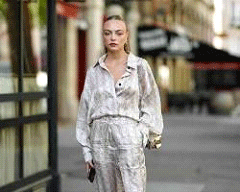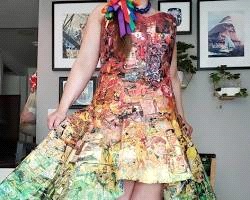As 2023 draws to a close, the global fashion industry presents a tapestry woven with contrasting threads. While glimmers of recovery and innovation shine through, the year has been marked by uncertainty, economic anxieties, and the ever-present shadow of climate concerns. Let's unravel the key trends that shaped global fashion in this tumultuous year:
 Comfort Reigns Supreme
Comfort Reigns Supreme
The pandemic's lingering influence, coupled with rising inflation, saw consumers prioritize comfort and practicality over fleeting trends. Loungewear, athleisure, and oversized silhouettes dominated wardrobes, with brands like Lululemon and Uniqlo experiencing significant growth. Comfort wasn't just about casual dressing, though. Tailoring saw a resurgence, with a focus on comfortable yet stylish work-from-home attire.
Sustainability Takes Center Stage
Consumers became increasingly conscious of the environmental and ethical impact of their clothing choices. Sustainable brands like Patagonia and Veja flourished, while established players like H&M and Zara ramped up their sustainability efforts. Upcycling, recycled materials, and ethical sourcing became buzzwords, pushing the industry towards a more responsible future.
The Digital Push Persists
E-commerce continued its relentless march, further fueled by pandemic restrictions and convenience-seeking consumers. Brands embraced omnichannel strategies, seamlessly blending online and offline experiences. Social media remained a powerful tool for marketing and trendsetting, with platforms like TikTok and Instagram influencing purchasing decisions.
 Diversity and Inclusion Gain Momentum
Diversity and Inclusion Gain Momentum
The conversation around diversity and inclusion in fashion gained much-needed traction. Body positivity campaigns, gender-neutral collections, and increased representation of marginalized communities became commonplace. Brands like Chromat and Gypsy Sport championed inclusivity, paving the way for a more diverse and representative fashion
Challenges and the Road Ahead
Despite the promising trends, the industry faced significant challenges. Inflation and supply chain disruptions led to rising costs and production delays. The war in Ukraine further exacerbated these issues, casting a shadow over global trade and economic stability.
Looking ahead, the future of fashion remains uncertain. However, brands that can adapt to changing consumer preferences, embrace sustainability, and prioritize ethical practices will be best positioned to thrive. Embracing technology, fostering inclusivity, and offering value beyond just trends will be key to navigating the tangled threads of the global fashion landscape in the years to come.












